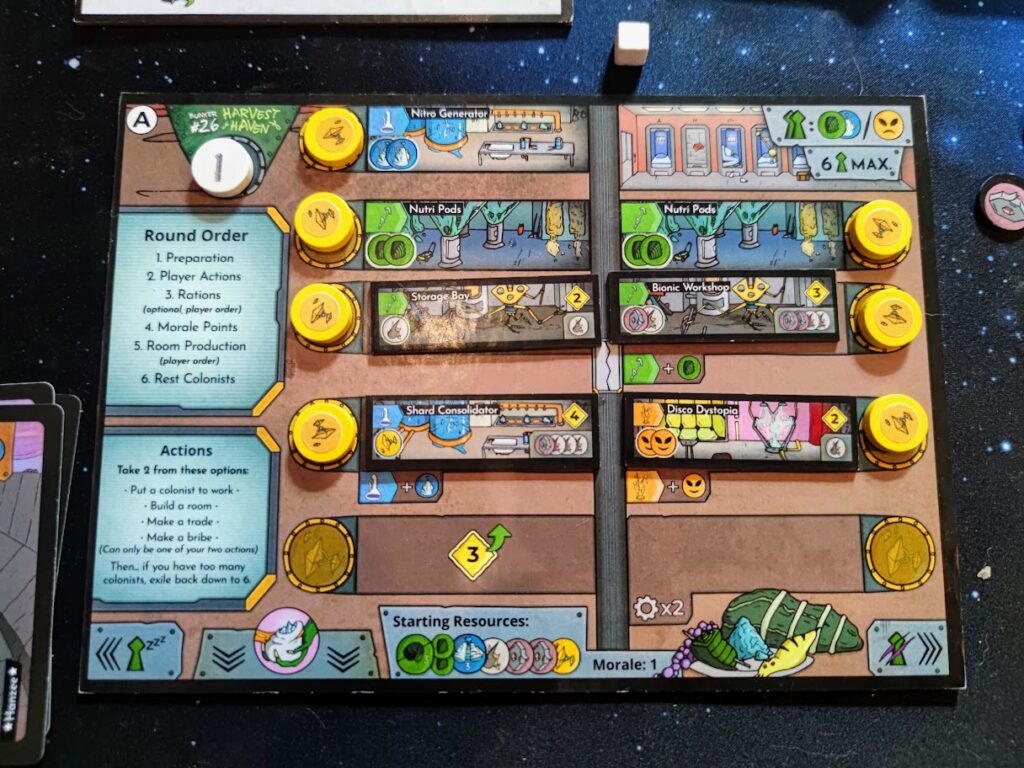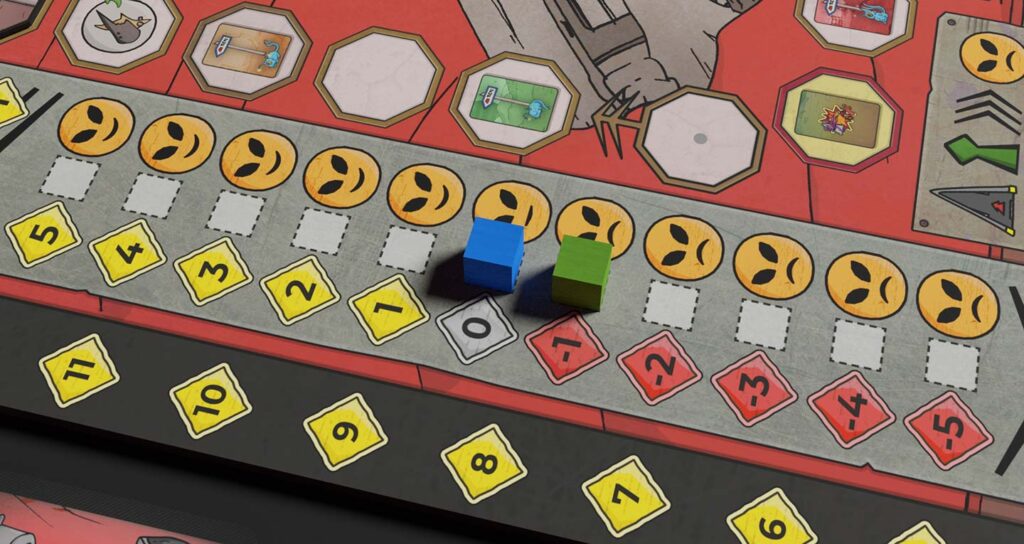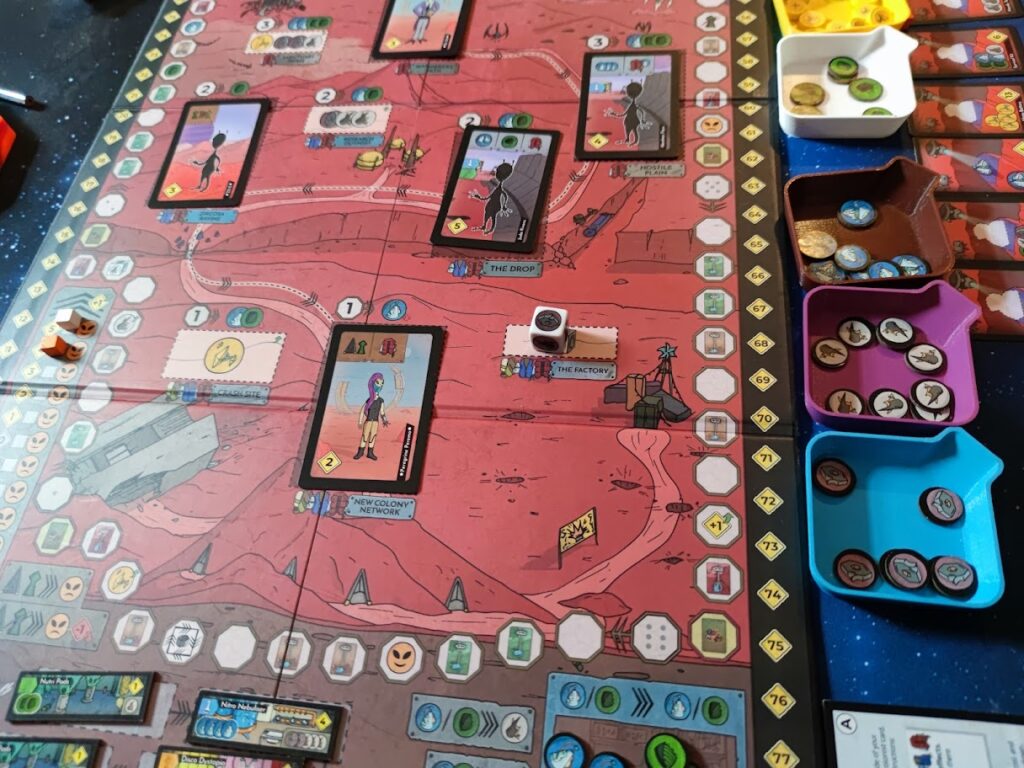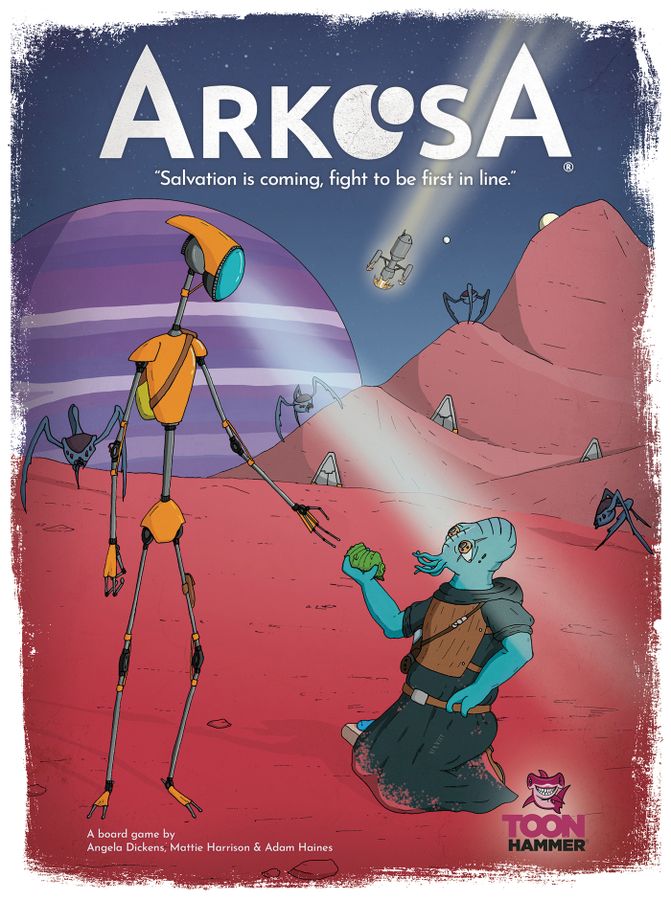Arkosa, the new title from Toon Hammer, plonks you on the titular planet of Arkosa, and makes you try to leave it. You see, there’s an opportunity to get off this desert world, but only the most prestigious of colonies gets the ticket. You need to build rooms in your bunkers, collect and spend resources, and entice colonists to make your bunker their new home. There are only three rounds to do it, so you’d better get moving.
Bunker hunkering
I’ve loved making bases my whole life. From building blanket-and-cushion forts behind the sofa as a kid, or using branches in the woods, through to special rules games of Worms on the PC where my brother and I took the first few minutes to put up barricades before the onslaught began. Even now, video games like Rimworld, Subnautica, and even Minecraft give me that same feeling of making my own little space. Fort, camp, treehouse, soft toy dungeon model iron maiden – they’re all just other names for a bunker.

Arkosa is a board game which feeds that same need. Each player’s board is an underground bunker where they can build rooms for their colony, and those same rooms help generate resources. Resources are scarce – it’s a desert planet after all – so anything you can do to help make more of them is a good thing. The colonists themselves are represented by cards with suitably outlandish alien illustrations. No-one gets a free ride though, so they’ll have to work for their spot in the bunker.
Scavenging in the sand
You can send your colonists out on expeditions, into the barren wasteland. The way it’s done is pretty clever and does a good job of adding some thematic touches. You need to spend precious food and nitrogen, presumably to keep them alive, then they’ll come back with either scrap you can you to build new rooms, or more colonists to add to the crew. There’s real shades of deckbuilding here, but it doesn’t feel like Dominion, as you’re not building a hand to combo. You’re adding people (aliens?) who you get to use during your turns.
There’s a nice feature that means every time you take a jaunt out into the wastelands, the action space you choose moves a marker around the exploration track. Stopping on certain spaces triggers either events or raids, which generally try to scupper you in some way. It’s another of the nice thematic links back – the longer you spend out wandering around a hostile world, the more likely you are to get in trouble. There’s no hidden information either. You know the moment you choose an action space whether it’s going to trigger an event or not, which adds a nice bit of risk and reward into the game.

You might read the paragraph above and think “Action spaces? Ah, it’s a worker-placement game!”, and in a way you’d be kinda right, but not really. There are action spaces all over the board, just like a good worker-placement game, and you get to choose two actions on each of your turns. But you never place a worker. You choose a space, but no marker goes on the board. It’s more like a declaration of what you’ve spent your turn on.
Lost in space
There was something nagging at me when I was playing Arkosa, and it wasn’t until I sat down to write this preview with my notes that I realised what it is. The board feels a little redundant. The artwork is bright and cartoony, there are spaces for colonist cards, and action spaces, sure. But you never really interact with the vast majority of the board. Because you don’t place a worker, you can take an entire turn almost no interaction with it.
As an example, if I chose an action which granted me some scrap and magtape in return for food and nitrogen, the only time I’d touch the board would be to move the marker around the exploration track. I’d take some tokens from the supply, and add some back. In fact the majority of the times you interact with anything else on the board is to take a colonist card or room tile from it.
This doesn’t really affect the quality of the game at all. It’s still a great game, full of meaningful decisions. It just feels like a missed opportunity to either use a smaller board, or to add some alien meeples and turn it into a worker-placement game. It’s a non-tangible thing, it’s just a feeling of not getting a proper chance to play with the toy on my table.
Engine test
What Arkosa is, is a great engine-builder game. It’s a two-part engine, and the trick to doing well is managing to combine your colonists with the rooms you’re building, and reaping the benefits. When you get it right, it feels great. There are so many ways to get your engine firing on all cylinders, and you can even overbuild on previously-built rooms, if the urge strikes you to change things up. There’s very little player interaction, and what there is is randomly driven by the event and raid cards. As it’s an action selection game, and not a case of claiming spots on the board, it means your options are only limited by your own resources, not because someone’s blocked you off.

Some of you reading this are really going to dig that. A Euro game set in space, which delivers its theme in a convincing way, and doesn’t have player interaction. It’s a Euro gamer’s dream in many ways. It’s another game which feels like it’s ending just as it’s getting going, with only three rounds on offer. But as with games like Everdell, the aim of the game is to really pull all those strings together at the end and see if you’ve made a cat’s cradle, or the web of a spider on LSD.
It plays out nice and quickly too, which is important in a medium-weight Euro. If games like this drag on too long, they can easily outlast the attention span of the players.
Final thoughts
Arkosa is a really good game. There seems to be a great balance between the various resources on offer, and I really enjoy the way the rooms and colonists grow in power as the game goes on. Each round changes the state of the board in some way, and make you re-think your plans. I like it when a game keeps you on your toes like this.
Another really nice touch is the use of double-sided player boards. There’s a basic faction side, which is nearly identical for all players, but when you’re more experienced, there’s a cornucopia of colourful races to play as, each with their own abilities. Speaking of colourful, the cartoony artwork might not appeal to everyone, but I like it. It’s a nice change from the sombre hues and muted tones of some Euros.
I want to give a nod to the writing too. Someone at Toon Hammer is a big fan of words, and they’ve gone to great lengths to breathe life into the world we find ourselves stranded on. There is so much flavour text on the multitude of event cards, and it’s really well-written. I think Arkosa would make an excellent introduction to Euro games for someone new to the scene, and I think Toon Hammer have got a really good game under their belts. I really hope it gets the recognition and exposure it deserves, and I’m looking forward to seeing what they come up with next.
Preview copy kindly provided by Toon Hammer. Thoughts and opinions are my own.

Arkosa (2021)
Designer: Angela Dickens
Publisher: Toon Hammer
Art: Mattie Haines
Players: 2-4
Playing time: 50-90 mins
Adam is a board game critic with over 15 years of experience in the hobby. A semi-regular contributor to Tabletop Gaming Magazine and other publications, he specialises in heavyweight Euro games, indie card games and transparency in board game media.

